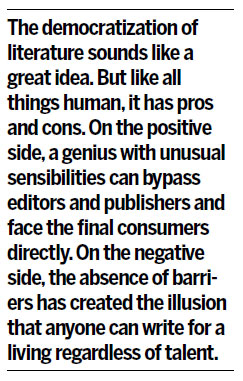Pulp fiction in the digital age
Updated: 2013-07-13 08:27
By Raymond Zhou (China Daily)
|
|||||||||||


Online books have spawned a few good writers and paved the way for the migration to digital media. But beneath the democratic smiley face lies the price that both creators and consumers have to pay.
Shortly before midnight on June 16, Sollong updated his online novel, adding a new chapter. A few hours later he was dead. His friends say he worked himself to death.
Sollong, whose Chinese handle means Snowfall for Ten Years, was a professional scribe who worked exclusively on web fiction. Only the management at Qidian.com, where he was a contracted writer, knows his real name and even they need to consult a database to find it. You see, Qidian claims to have 1.6 million contracted novelists, which translates to a huge army of mostly youngsters hunched over computers and churning out mountains of words for quick consumption.
Sollong was toiling on his latest novel, titled Wu Over the World (Wubutianxia), a martial arts fantasy that has unveiled 1.6 million Chinese words, garnered 1.4 million clicks and been recommended 44,000 times. He was lured into the vocation by the dream of making it big, with literature websites like Qidian constantly touting success stories. But for each one who rakes in a million yuan in annual revenue, there may be hundreds of thousands of others who cannot make ends meet. Sollong was not among the highest paid and he had to work non-stop to pay his rent.
Out of every 100 online writers, according to industry insiders, about 90 don't make a penny as they offer the early chapters of books free in order to build an audience.
Of the remainder, only one can bring home an enviable salary, with three to five earning white-collar wages and the others making some pocket money.
Sollong was one of the worker ants whose fiction not only attracts hordes of paying readers but also provides story elements for more lucrative games, television or movie deals. The Internet has proven to be at once heaven and hell for wannabe wordsmiths bent on becoming the next Mo Yan or Louis Cha.
On one hand, the lowering of the bar means you do not need to overcome the pride of literary publications and the prejudice of editors. On the other hand, you have to maintain such a high output that writing has turned from a mental exercise into a purely physical one.
Successes can be enticing. Wu Xuelan, whose pen name is Liulianzi, uploaded her novel about an imperial harem onto her blog in 2006 and pretty soon developed it into what later became a best-selling multi-volume novel and, in recent years, one of China's highest-rated television dramas with a potential deal to be shown in the US.
She is one of a dozen young writers who started online and were recently admitted to the writers' association, a confirmation of their achievements.
In 2002, Murong Xuecun published his novel Please Forget Me Tonight, Chengdu online. It drew a large following and a television adaptation. He became famous and shifted battleground to investigative reporting and social commentary, where he has gained even more respectability.
Obviously not every online writer is as talented as Wu Xuelan or Murong Xuecun. Percentage-wise, much online fiction can be correctly called "trash". Who can produce 10,000 words a day and retain any semblance of quality? I have heard of daily outputs that I cannot even get through reading, let alone writing. Mind you, this is not a spurt of creativity, but a level of drudgery maintained year round.
If you churn out a tome as thick as Les Miserables on an annual basis, rest assured it's never going to be as good as Les Miserables. Of course, the target readers are not expecting great literature anyway. In a recent survey of 3,000 respondents, A Dream of the Red Mansion, arguably China's number one fiction masterpiece, topped a list of "boring books". Les Miserables was not on it, but it could well have been.
Today's readers just yearn for a good yarn. But collectively they have shattered a preconceived notion that reading in the digital age has turned fragmentary. Indeed, reading the multi-volume A Dream of the Red Mansion on a smartphone or a tablet seems a hassle, but it is no longer an outlandish idea. China's own online readers have shown that they are willing to get through thousands of pages of digitized content if they deem it interesting.

Amazon was betting on mass migration to the digital platform when it launched two of its Kindle e-readers in China in early June. The online behemoth already owns an online bookstore in China that sells old-fashioned print copies, and now it is covering the base that serves future needs. According to a friend of mine who works in the publishing industry, Amazon's entry into China's digital reader market has already caused ripples. Websites that used to offer downloading of pirated books have suddenly shifted gear and got into the legal e-book business.
This implies that there's money to be made in this segment, which, in turn, means people are migrating en masse to the new paperless platform for serious reading. However, this is yet to be supported by empirical evidence gathered on a bus or train ride. On a long commute, the most popular activity is by far listening to music. Only occasionally do you spot someone with a book, almost always a test prep book of some kind. The recent rise of the tablet has given way to a trend for watching videos and playing games. Again, there is the odd person scrolling down pages of text, perhaps a classic tome or a modern-day fantasy by a literary hack like Sollong.
The democratization of literature sounds like a great idea. But like all things human, it has pros and cons. On the positive side, a genius with unusual sensibilities can bypass editors and publishers and face the final consumers directly. On the negative side, the absence of barriers has created the illusion that anyone can write for a living regardless of talent. In reality, the removal of the middlemen (editors and publishers) has shifted the cost of winnowing out the worthless to the readers. Because virtual space does not entail any cost like page layout and printing, a literature website can function like a kitchen sink.
That's why people who regard time as valuable would never trudge through a morass of online fiction to get to that rare gem. They would rather pay a higher price for professional editors to do the dirty job for them. You can argue that printed potboilers do not have much quality either, but still the worst has probably been rejected already.
Reading habits change over time. Theoretically, good literature is worth reading on any medium. But the change of medium from print to digital will definitely affect content. And it could affect pricing and profits too, allowing them to come from sources other than a single payment for a book. Advertising, monthly subscriptions and pay-per-word may also surface as possible revenue models.
Works by Dickens and Louis Cha appeared in installments, which were surely correlated to the authors' earnings. They are long, but in no way do they read like they were written by zombies. Today we do not remember them as writers of newspaper serials, but simply, as great novelists. For China's online crowd of scribblers, or rather, typists, their staying power will emerge when the medium of the Internet is no longer relevant.
Contact the writer at raymondzhou@chinadaily.com.cn.
(China Daily 07/13/2013 page11)
Today's Top News
China's government spends less in 2012
Obama weighs canceling Moscow talks with Putin
Xi hails closer cooperation with Switzerland
Yuan: Collateral types to expand
Overall home price rise softens
'Downside risk can be managed'
Detroit files biggest ever US municipal bankruptcy
Mandela turns 95 in hospital bed
Hot Topics
Lunar probe , China growth forecasts, Emission rules get tougher, China seen through 'colored lens', International board,
Editor's Picks

|

|

|

|

|

|





